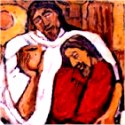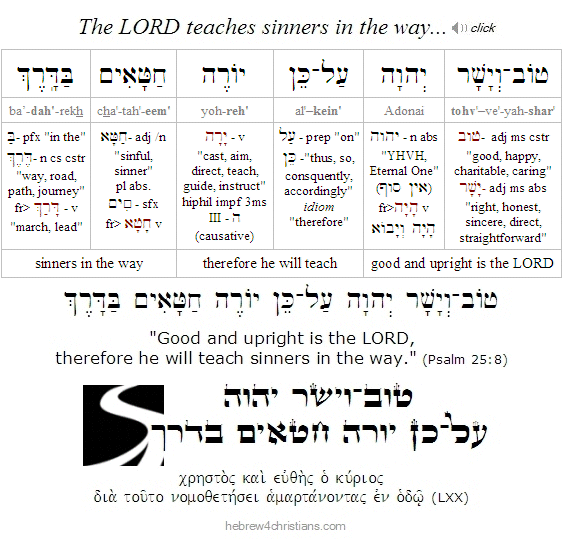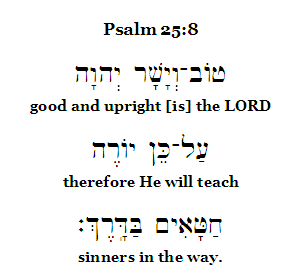|
IT'S BEEN RIGHTLY SAID THAT God doesn't have any grandchildren in heaven, only children: He is not your "heavenly grandfather" but your heavenly Father (ūÉų▓ūæų┤ūÖūøųČūØ ūæų╝ųĘū®ų╝ūüųĖū×ųĘūÖų┤ūØ). And just as a good father disciplines his children for their own good, so does your Father in heaven (Prov. 3:11, Heb. 12:5-7). The discipline of God leads you to do teshuvah for your ultimate good (Rom. 2:4). As C.S. Lewis once remarked, God doesn't love you because you are good, but He will make you good because He loves you.
The Hebrew word derekh (ūōų╝ųČū©ųČūÜų░), often translated as "way," metaphorically refers to the journey, manner, or course of your life. Because God is tov v'yashar (good and upright), he teaches his children to be yesharim (ūÖų░ū®ūüųĖū©ų┤ūÖūØ), i.e., those who walk uprightly. Indeed, the way of the LORD (ūōų╝ųČū©ųČūÜų░ ūÖūöūĢūö) is "to do acts of charity and justice" (ū£ųĘūóų▓ū®ūéūĢų╣ū¬ ū”ų░ūōųĖū¦ųĖūö ūĢų╝ū×ų┤ū®ūüų░ūżų╝ųĖūś) (Gen. 18:19). This is the "straight way" (derekh ha-yashar), or the "narrow path" that leads to life (Matt. 7:14). The yesharim are known by the good fruit of their lives (Matt. 7:15-23).
Note that the verb used in this verse (ūÖūĢų╣ū©ųČūö) comes from the root yarah (ūÖū©ūö) -- the same root used in the word Torah (ū¬ų╝ūĢų╣ū©ųĖūö). Because the LORD is good and upright, He gives us Torah for our lives. God educates us for eternity by imparting to us moral and spiritual truth. As King David taught, "Happy is the man who delights in the Torah of the LORD and meditates upon it day and night" (Psalm 1:1-2).
Surely followers of Yeshua the Mashiach should likewise love and study the Torah. After all, Yeshua was the Angel of the LORD (ū×ųĘū£ų░ūÉųĘūÜų░ ūÖūöūĢūö) who spoke at Sinai when the Torah was given to Israel (Exod. 3:2, Deut. 4:12), and he is the same "yesterday, today, and forever" (Heb. 13:8). During his earthly ministry, Yeshua studied Torah and clearly taught us to keep the ways of the LORD (Luke 4:16, Matt. 7:12). He repeatedly affirmed the central teaching of the Torah ŌĆō the Shema ŌĆōputting the duty to love God above all else (Deut. 6:4-6; Mark 12:29). Indeed, the "New Covenant" itself promises that the Torah would be written "upon our hearts" (Jer. 31:31-33, cp. Matt. 26:28) and is inscrutable apart from it ŌĆō just as Yeshua himself clearly taught (Luke 24:27; see also: Matt. 5:17, Rom. 15:4, 1 Cor. 10:11, 2 Tim. 3:14-17, etc.).
Yeshua is called derekh ha-chayim (ūōų╝ųČū©ųČūÜų░ ūöųĘūŚųĘūÖų╝ų┤ūÖūØ), the way of life (John 14:6). He is the Wonder of the Torah, its living expression and goal. With the psalmist, therefore, we earnestly pray: ūÆų╝ųĘū£ųŠūóųĄūÖūĀųĘūÖ ūĢų░ūÉųĘūæų╝ų┤ūÖūśųĖūö ūĀų┤ūżų░ū£ųĖūÉūĢų╣ū¬ ū×ų┤ū¬ų╝ūĢų╣ū©ųĖū¬ųČūÜųĖ / gal einai v'abitah nifla'ot mi-Toratekha: "Uncover my eyes and I will behold wonders from your Torah" (Psalm 119:18).
Hebrew Lesson
Psalm 25:8 reading (click):
Important Addendum
It's important to keep in mind that by the word "Torah" I am not referring to the Rabbinical traditions of post-Temple Judaism but rather to the "instruction" or "teaching" of the LORD God of Israel. As I've repeatedly explained in my writings, Torah is always a function of covenant -- as man's responsibility -- and therefore Torah has changed in light of God's different covenantal actions in history (Heb. 7:12). Followers of Yeshua abide by the "law of Messiah" (ū¬ų╝ūĢų╣ū©ųĘū¬ ūöųĘū×ų╝ųĖū®ūüų┤ūÖūŚųĘ), that is, the teaching of Yeshua the Messiah (John 14:15, Gal. 6:2, 1 John 5:2, 2 John 1:6). For more information about this subject, please see the article entitled "Olam Ha-Torah" as well as various other articles on this site.
<< Return
|



